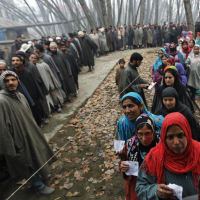Jammu & Kashmir Votes With Its Feet, Defies Boycott Call by Separatists
 The turnout in Kashmir Valley was the “highest since Independence” (photo: Reuters)
The turnout in Kashmir Valley was the “highest since Independence” (photo: Reuters)
Voters came out in large numbers on Tuesday to vote in the first phase of the state election in Jammu & Kashmir, ignoring calls by separatist leaders for a boycott. The 15 constituencies that went to the polls in the first phase saw 71.28% turnout, more than a 5% jump over the 2008 figure of 64.9%.
Deputy Election Commissioner Vinod Zutshi said in Delhi that the turnout in the state was also higher than the 52.6% in the general election in May, while for Kashmir, it was the “highest since Independence”. He attributed it to adequate security and to an increased awareness among voters despite the devastating flood this year.
The Kashmir Valley alone saw an 11% rise to record its highest ever turnout (71%), the Jammu region also recorded 71%, and Ladakh saw 68% polling.
The high turnout is being seen as a result of massive mobilisation by parties. Both the regional PDP and Prime Minister Narendra Modi’s BJP are vying to be the largest parties in the new assembly, riding a wave of anti-incumbency against the National Conference (NC) and Congress who were in power for six years together. Yet the two ruling parties have broken their alliance and have galvanised resources to encourage their traditional voters to the booth.
Incumbent chief minister and NC working president Omar Abdullah tweeted, “Good luck to all my colleagues whose electoral fates will be determined today... Reports of brisk polling in the Valley are very encouraging. Glad to hear turnout in Chenab valley seats also picking up.”
But interpreting the heavy voting as “a reflection of people’s desire for change”, PDP spokesperson Nayeem Akhtar said, “When people want to punish someone, in a democracy, they come out in large numbers. Congress and NC will be the biggest losers.”
Some voters told reporters they had come out to vote in the hope that there would be development in a region held back by years of strife and the recent floods that destroyed homes and livelihoods.
Others said they were wary of the BJP and its bid to win power for the first time in Muslim-majority Jammu & Kashmir. The state has enjoyed a special status in the Indian constitution since one third of this Himalayan region was occupied by Pakistan in 1947.
The BJP has little presence in the Kashmir Valley, but emboldened by Modi's stunning victory in national elections in May and in recent state elections in Haryana and Maharashtra, it is hoping to pick most seats from the Hindu-dominated Jammu and Buddhist Ladakh parts of the state and win enough support from independents in the Kashmir Valley to become the largest party in the assembly.
“The 2008 elections are far behind. Now it’s a fight between PM Modi and the rest. People are going to vote either for or against him. The turnout shows people are rallying behind the PM, for change,” BJP campaign committee member Hari Om told Reuters.
Consolidation and polarisation of votes along religious lines in Jammu could benefit the BJP, though the large voter turnout in the Kashmir Valley could impact its chances there.
“We are coming out in large numbers to vote to block the Modi wave. We feel they will erode the special status of Kashmir and change the demography of the state as BJP is working on secret agenda," claimed Maroof Ahmad, 22, in Ganderbal constituency.
"The time is ripe for political change here," Modi told a rally at the weekend, promising to turn the region of snow-clad mountains and gushing streams into a top tourist destination.
The remaining areas of Jammu & Kashmir will go to the polls in the next several weeks and the result will be declared on December 23.
To Learn More:
Kashmiris turn out to vote as BJP bids for power (by Fayaz Bukhari, Reuters)
Jammu and Kashmir: From boycott to ballot, the swing (by Bashaarat Masood, Indian Express)
J&K polls: Valley opts for ballot over bullet with 71 per cent voting in first phase (Indian Express)
- Top Stories
- Controversies
- Where is the Money Going?
- India and the World
- Appointments and Resignations
- Unusual News
- Latest News
- India College Chain’s Expansion into U.S. Draws Opposition from Massachusetts Officials over Quality of Education
- Milk Shortages in India Tied to Release of New Movies Featuring Nation’s Favorite Stars
- Confusion Swirls around Kashmir Newspaper Ban in Wake of Violent Street Protests
- Polio-Free for 5 Years, India Launches Vaccine Drive after Polio Strain Discovery
- New Aviation Policy Could Increase Service, Lower Ticket Prices






Comments